Organisational Behaviour Analysis: A David & Co Ltd - Report
VerifiedAdded on 2020/11/23
|21
|7278
|491
Report
AI Summary
This report delves into the realm of organisational behaviour, examining how culture, power dynamics, and workplace politics influence individual and team performance within the context of A David & Co Ltd, a food and beverage company. It explores the impact of organisational culture, including Handy's model, and analyzes the influence of different forms of power, such as legitimate, expert, and reward power. The report also evaluates the positive and negative impacts of organisational politics. Furthermore, it investigates motivation theories, including content and process theories, to determine how they enable the effective achievement of goals within an organisational setting. The report also determines the characteristics of effective and ineffective teams, and applies relevant concepts and philosophies of organisational behaviour to the case study. The report concludes by highlighting key findings and recommendations for the company.
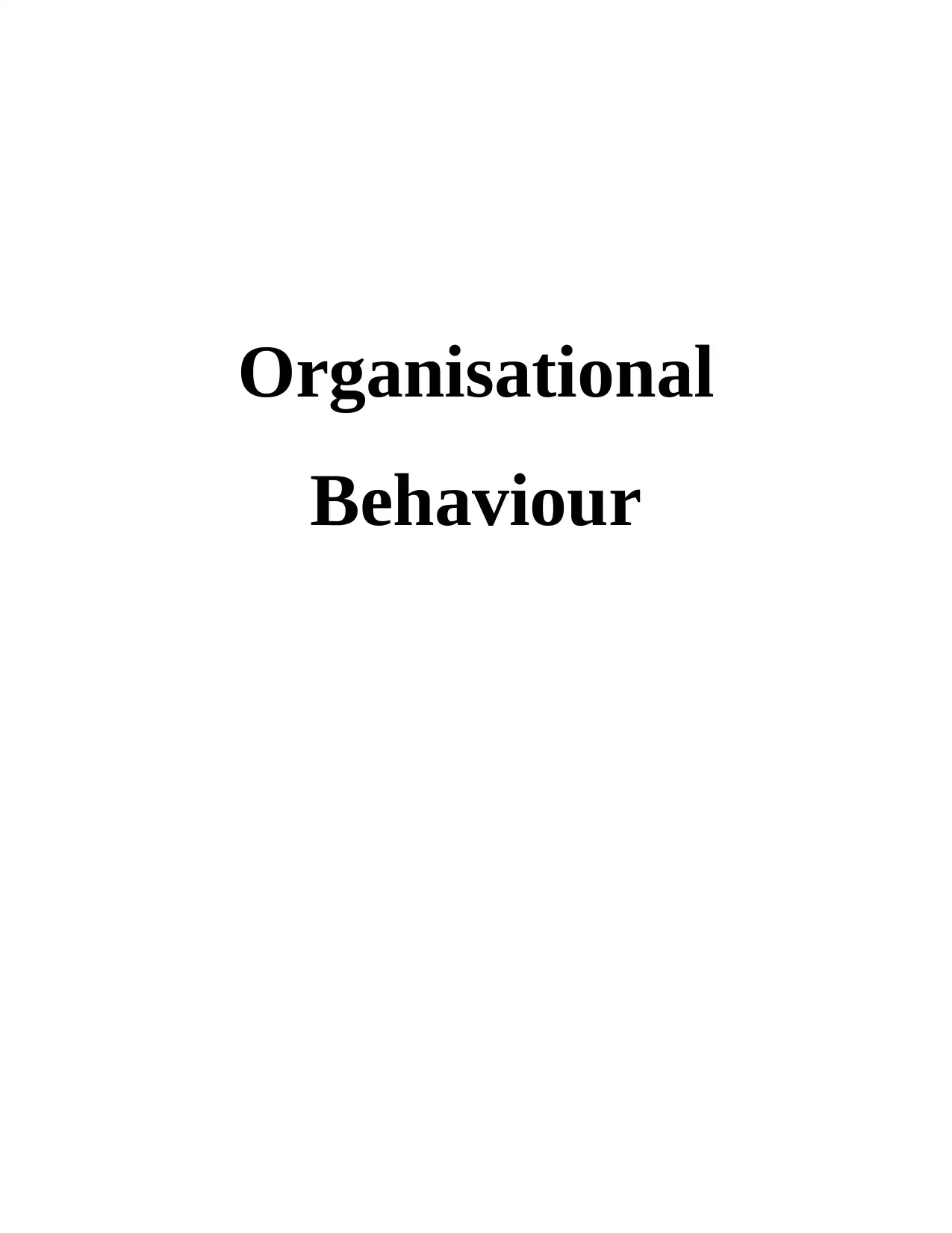
Organisational
Behaviour
Behaviour
Paraphrase This Document
Need a fresh take? Get an instant paraphrase of this document with our AI Paraphraser
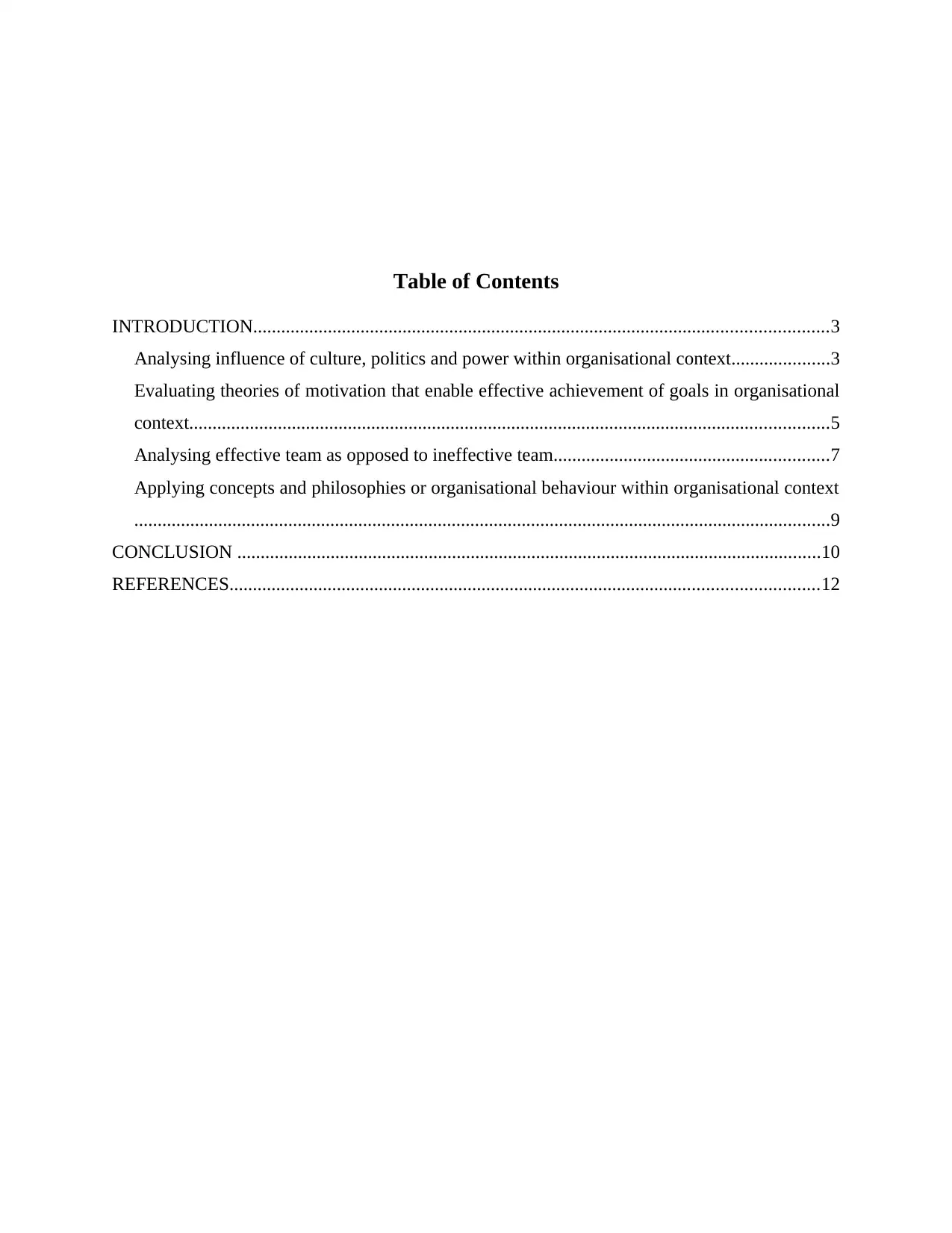
Table of Contents
INTRODUCTION...........................................................................................................................3
Analysing influence of culture, politics and power within organisational context.....................3
Evaluating theories of motivation that enable effective achievement of goals in organisational
context.........................................................................................................................................5
Analysing effective team as opposed to ineffective team...........................................................7
Applying concepts and philosophies or organisational behaviour within organisational context
.....................................................................................................................................................9
CONCLUSION .............................................................................................................................10
REFERENCES..............................................................................................................................12
INTRODUCTION...........................................................................................................................3
Analysing influence of culture, politics and power within organisational context.....................3
Evaluating theories of motivation that enable effective achievement of goals in organisational
context.........................................................................................................................................5
Analysing effective team as opposed to ineffective team...........................................................7
Applying concepts and philosophies or organisational behaviour within organisational context
.....................................................................................................................................................9
CONCLUSION .............................................................................................................................10
REFERENCES..............................................................................................................................12
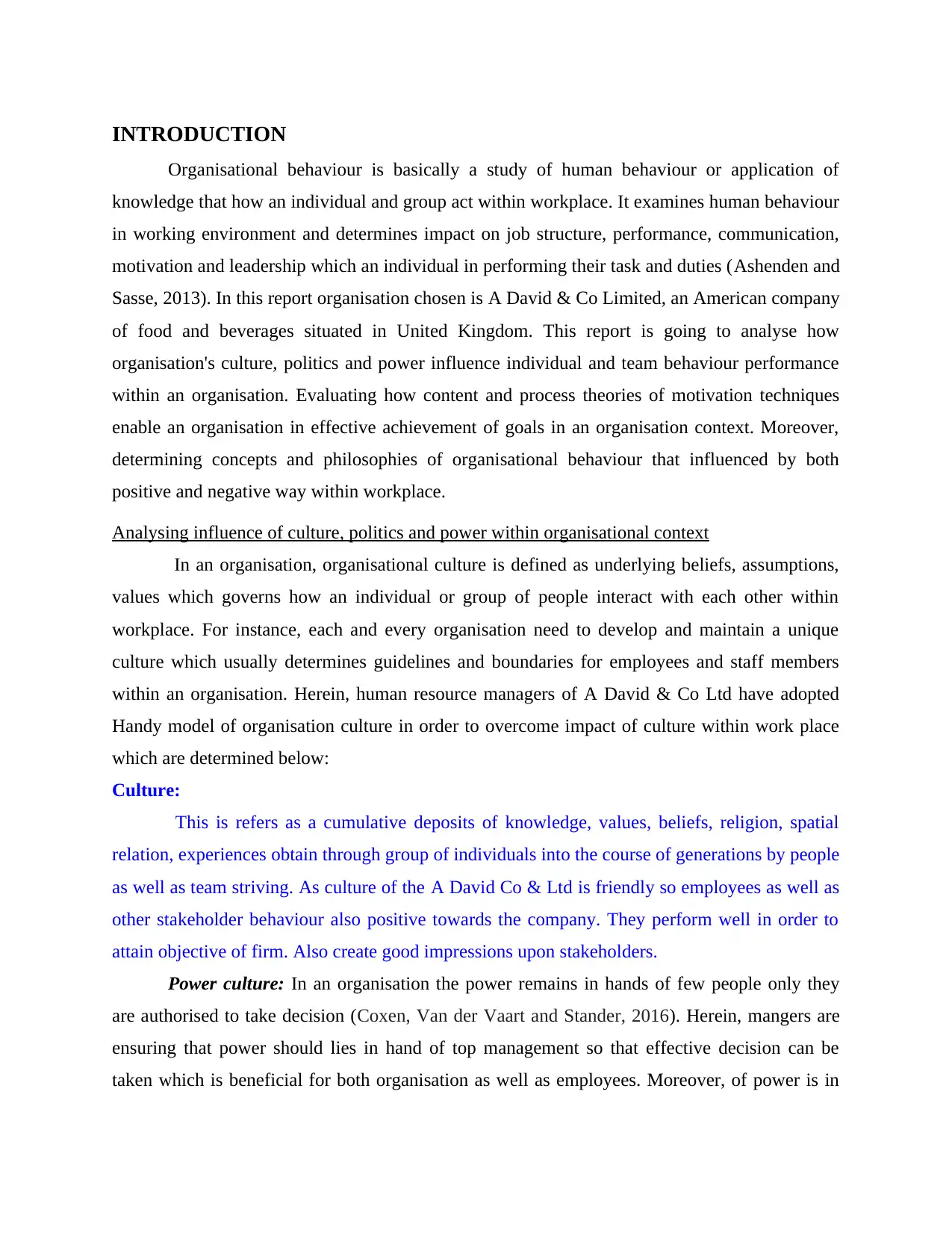
INTRODUCTION
Organisational behaviour is basically a study of human behaviour or application of
knowledge that how an individual and group act within workplace. It examines human behaviour
in working environment and determines impact on job structure, performance, communication,
motivation and leadership which an individual in performing their task and duties (Ashenden and
Sasse, 2013). In this report organisation chosen is A David & Co Limited, an American company
of food and beverages situated in United Kingdom. This report is going to analyse how
organisation's culture, politics and power influence individual and team behaviour performance
within an organisation. Evaluating how content and process theories of motivation techniques
enable an organisation in effective achievement of goals in an organisation context. Moreover,
determining concepts and philosophies of organisational behaviour that influenced by both
positive and negative way within workplace.
Analysing influence of culture, politics and power within organisational context
In an organisation, organisational culture is defined as underlying beliefs, assumptions,
values which governs how an individual or group of people interact with each other within
workplace. For instance, each and every organisation need to develop and maintain a unique
culture which usually determines guidelines and boundaries for employees and staff members
within an organisation. Herein, human resource managers of A David & Co Ltd have adopted
Handy model of organisation culture in order to overcome impact of culture within work place
which are determined below:
Culture:
This is refers as a cumulative deposits of knowledge, values, beliefs, religion, spatial
relation, experiences obtain through group of individuals into the course of generations by people
as well as team striving. As culture of the A David Co & Ltd is friendly so employees as well as
other stakeholder behaviour also positive towards the company. They perform well in order to
attain objective of firm. Also create good impressions upon stakeholders.
Power culture: In an organisation the power remains in hands of few people only they
are authorised to take decision (Coxen, Van der Vaart and Stander, 2016). Herein, mangers are
ensuring that power should lies in hand of top management so that effective decision can be
taken which is beneficial for both organisation as well as employees. Moreover, of power is in
Organisational behaviour is basically a study of human behaviour or application of
knowledge that how an individual and group act within workplace. It examines human behaviour
in working environment and determines impact on job structure, performance, communication,
motivation and leadership which an individual in performing their task and duties (Ashenden and
Sasse, 2013). In this report organisation chosen is A David & Co Limited, an American company
of food and beverages situated in United Kingdom. This report is going to analyse how
organisation's culture, politics and power influence individual and team behaviour performance
within an organisation. Evaluating how content and process theories of motivation techniques
enable an organisation in effective achievement of goals in an organisation context. Moreover,
determining concepts and philosophies of organisational behaviour that influenced by both
positive and negative way within workplace.
Analysing influence of culture, politics and power within organisational context
In an organisation, organisational culture is defined as underlying beliefs, assumptions,
values which governs how an individual or group of people interact with each other within
workplace. For instance, each and every organisation need to develop and maintain a unique
culture which usually determines guidelines and boundaries for employees and staff members
within an organisation. Herein, human resource managers of A David & Co Ltd have adopted
Handy model of organisation culture in order to overcome impact of culture within work place
which are determined below:
Culture:
This is refers as a cumulative deposits of knowledge, values, beliefs, religion, spatial
relation, experiences obtain through group of individuals into the course of generations by people
as well as team striving. As culture of the A David Co & Ltd is friendly so employees as well as
other stakeholder behaviour also positive towards the company. They perform well in order to
attain objective of firm. Also create good impressions upon stakeholders.
Power culture: In an organisation the power remains in hands of few people only they
are authorised to take decision (Coxen, Van der Vaart and Stander, 2016). Herein, mangers are
ensuring that power should lies in hand of top management so that effective decision can be
taken which is beneficial for both organisation as well as employees. Moreover, of power is in
⊘ This is a preview!⊘
Do you want full access?
Subscribe today to unlock all pages.

Trusted by 1+ million students worldwide
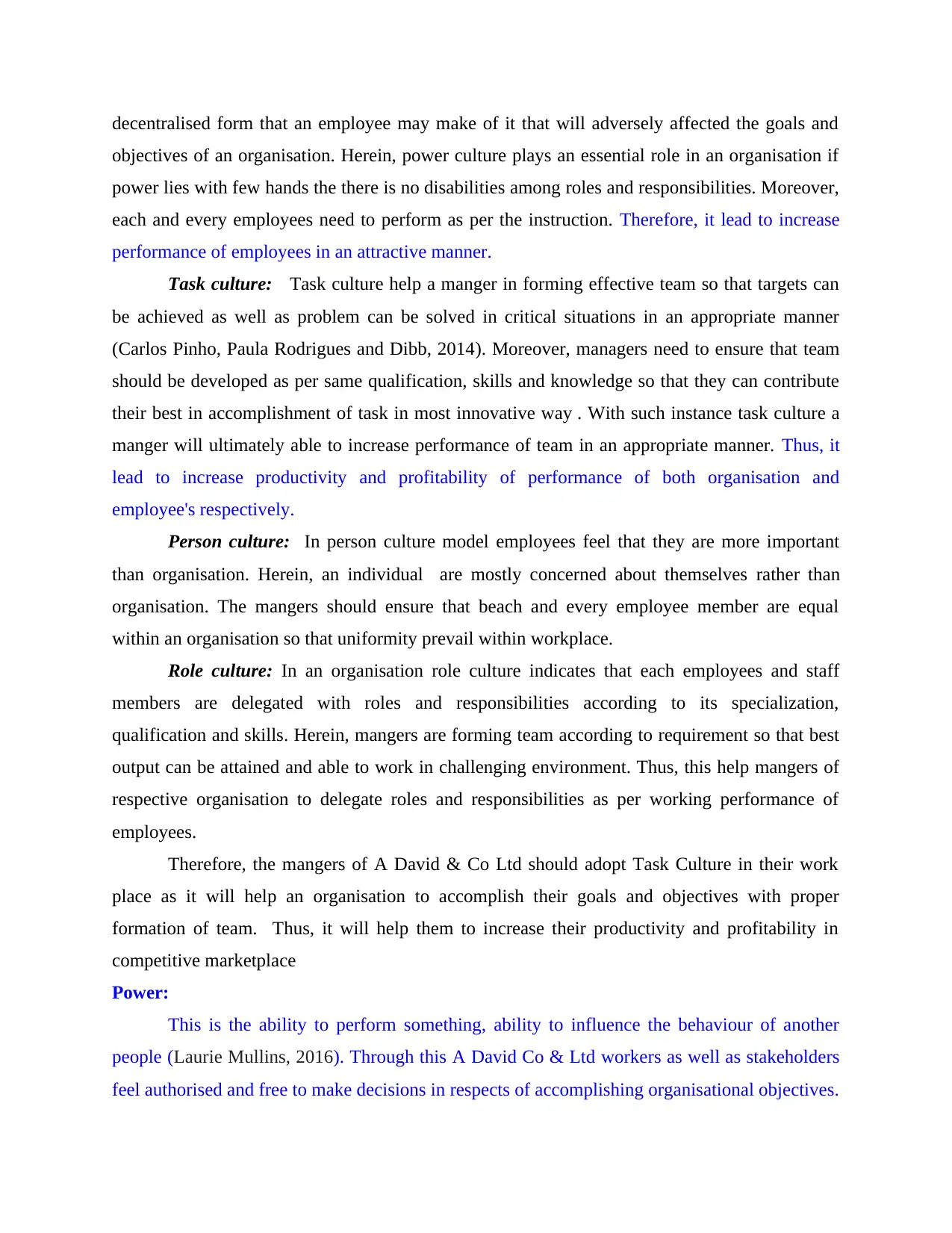
decentralised form that an employee may make of it that will adversely affected the goals and
objectives of an organisation. Herein, power culture plays an essential role in an organisation if
power lies with few hands the there is no disabilities among roles and responsibilities. Moreover,
each and every employees need to perform as per the instruction. Therefore, it lead to increase
performance of employees in an attractive manner.
Task culture: Task culture help a manger in forming effective team so that targets can
be achieved as well as problem can be solved in critical situations in an appropriate manner
(Carlos Pinho, Paula Rodrigues and Dibb, 2014). Moreover, managers need to ensure that team
should be developed as per same qualification, skills and knowledge so that they can contribute
their best in accomplishment of task in most innovative way . With such instance task culture a
manger will ultimately able to increase performance of team in an appropriate manner. Thus, it
lead to increase productivity and profitability of performance of both organisation and
employee's respectively.
Person culture: In person culture model employees feel that they are more important
than organisation. Herein, an individual are mostly concerned about themselves rather than
organisation. The mangers should ensure that beach and every employee member are equal
within an organisation so that uniformity prevail within workplace.
Role culture: In an organisation role culture indicates that each employees and staff
members are delegated with roles and responsibilities according to its specialization,
qualification and skills. Herein, mangers are forming team according to requirement so that best
output can be attained and able to work in challenging environment. Thus, this help mangers of
respective organisation to delegate roles and responsibilities as per working performance of
employees.
Therefore, the mangers of A David & Co Ltd should adopt Task Culture in their work
place as it will help an organisation to accomplish their goals and objectives with proper
formation of team. Thus, it will help them to increase their productivity and profitability in
competitive marketplace
Power:
This is the ability to perform something, ability to influence the behaviour of another
people (Laurie Mullins, 2016). Through this A David Co & Ltd workers as well as stakeholders
feel authorised and free to make decisions in respects of accomplishing organisational objectives.
objectives of an organisation. Herein, power culture plays an essential role in an organisation if
power lies with few hands the there is no disabilities among roles and responsibilities. Moreover,
each and every employees need to perform as per the instruction. Therefore, it lead to increase
performance of employees in an attractive manner.
Task culture: Task culture help a manger in forming effective team so that targets can
be achieved as well as problem can be solved in critical situations in an appropriate manner
(Carlos Pinho, Paula Rodrigues and Dibb, 2014). Moreover, managers need to ensure that team
should be developed as per same qualification, skills and knowledge so that they can contribute
their best in accomplishment of task in most innovative way . With such instance task culture a
manger will ultimately able to increase performance of team in an appropriate manner. Thus, it
lead to increase productivity and profitability of performance of both organisation and
employee's respectively.
Person culture: In person culture model employees feel that they are more important
than organisation. Herein, an individual are mostly concerned about themselves rather than
organisation. The mangers should ensure that beach and every employee member are equal
within an organisation so that uniformity prevail within workplace.
Role culture: In an organisation role culture indicates that each employees and staff
members are delegated with roles and responsibilities according to its specialization,
qualification and skills. Herein, mangers are forming team according to requirement so that best
output can be attained and able to work in challenging environment. Thus, this help mangers of
respective organisation to delegate roles and responsibilities as per working performance of
employees.
Therefore, the mangers of A David & Co Ltd should adopt Task Culture in their work
place as it will help an organisation to accomplish their goals and objectives with proper
formation of team. Thus, it will help them to increase their productivity and profitability in
competitive marketplace
Power:
This is the ability to perform something, ability to influence the behaviour of another
people (Laurie Mullins, 2016). Through this A David Co & Ltd workers as well as stakeholders
feel authorised and free to make decisions in respects of accomplishing organisational objectives.
Paraphrase This Document
Need a fresh take? Get an instant paraphrase of this document with our AI Paraphraser
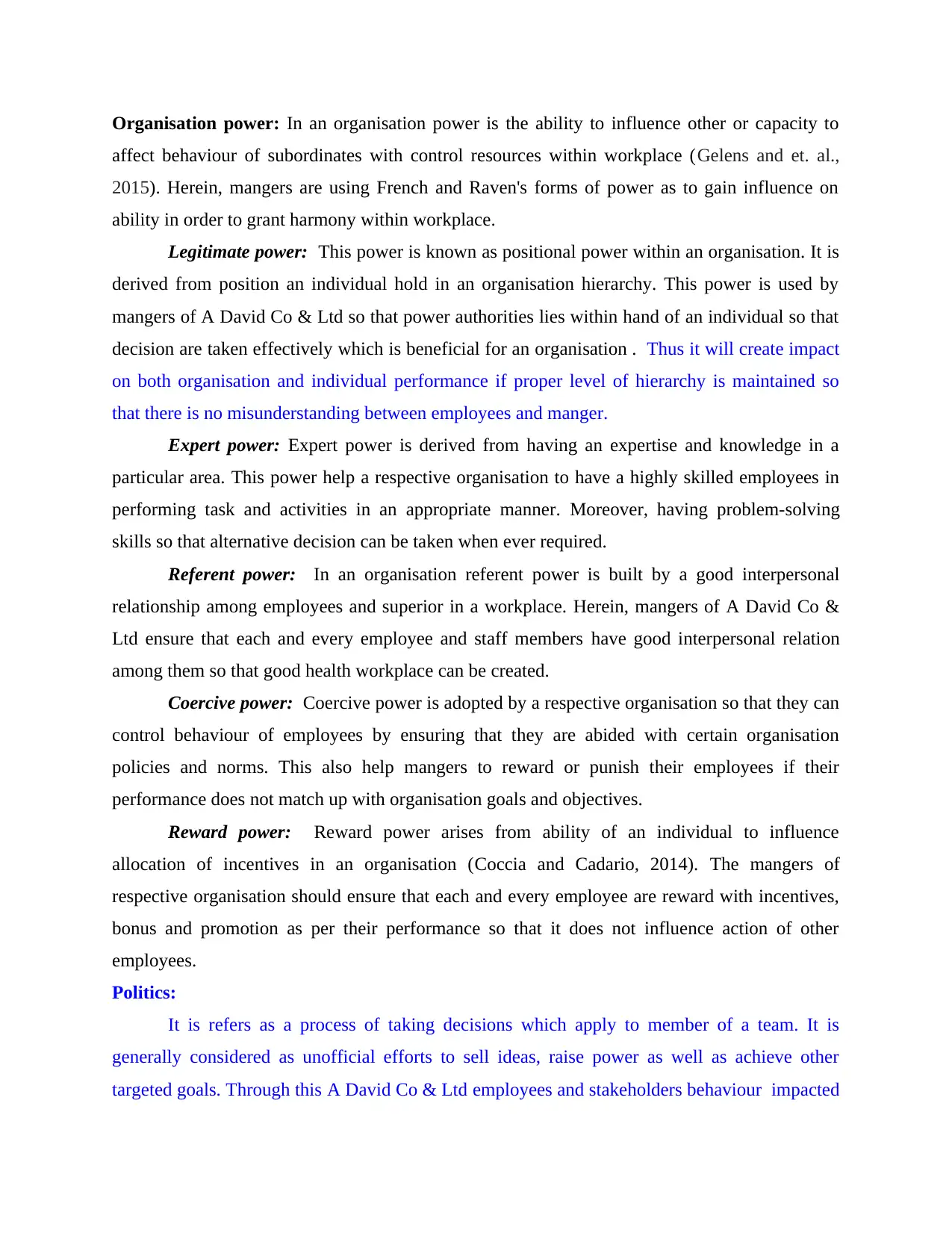
Organisation power: In an organisation power is the ability to influence other or capacity to
affect behaviour of subordinates with control resources within workplace (Gelens and et. al.,
2015). Herein, mangers are using French and Raven's forms of power as to gain influence on
ability in order to grant harmony within workplace.
Legitimate power: This power is known as positional power within an organisation. It is
derived from position an individual hold in an organisation hierarchy. This power is used by
mangers of A David Co & Ltd so that power authorities lies within hand of an individual so that
decision are taken effectively which is beneficial for an organisation . Thus it will create impact
on both organisation and individual performance if proper level of hierarchy is maintained so
that there is no misunderstanding between employees and manger.
Expert power: Expert power is derived from having an expertise and knowledge in a
particular area. This power help a respective organisation to have a highly skilled employees in
performing task and activities in an appropriate manner. Moreover, having problem-solving
skills so that alternative decision can be taken when ever required.
Referent power: In an organisation referent power is built by a good interpersonal
relationship among employees and superior in a workplace. Herein, mangers of A David Co &
Ltd ensure that each and every employee and staff members have good interpersonal relation
among them so that good health workplace can be created.
Coercive power: Coercive power is adopted by a respective organisation so that they can
control behaviour of employees by ensuring that they are abided with certain organisation
policies and norms. This also help mangers to reward or punish their employees if their
performance does not match up with organisation goals and objectives.
Reward power: Reward power arises from ability of an individual to influence
allocation of incentives in an organisation (Coccia and Cadario, 2014). The mangers of
respective organisation should ensure that each and every employee are reward with incentives,
bonus and promotion as per their performance so that it does not influence action of other
employees.
Politics:
It is refers as a process of taking decisions which apply to member of a team. It is
generally considered as unofficial efforts to sell ideas, raise power as well as achieve other
targeted goals. Through this A David Co & Ltd employees and stakeholders behaviour impacted
affect behaviour of subordinates with control resources within workplace (Gelens and et. al.,
2015). Herein, mangers are using French and Raven's forms of power as to gain influence on
ability in order to grant harmony within workplace.
Legitimate power: This power is known as positional power within an organisation. It is
derived from position an individual hold in an organisation hierarchy. This power is used by
mangers of A David Co & Ltd so that power authorities lies within hand of an individual so that
decision are taken effectively which is beneficial for an organisation . Thus it will create impact
on both organisation and individual performance if proper level of hierarchy is maintained so
that there is no misunderstanding between employees and manger.
Expert power: Expert power is derived from having an expertise and knowledge in a
particular area. This power help a respective organisation to have a highly skilled employees in
performing task and activities in an appropriate manner. Moreover, having problem-solving
skills so that alternative decision can be taken when ever required.
Referent power: In an organisation referent power is built by a good interpersonal
relationship among employees and superior in a workplace. Herein, mangers of A David Co &
Ltd ensure that each and every employee and staff members have good interpersonal relation
among them so that good health workplace can be created.
Coercive power: Coercive power is adopted by a respective organisation so that they can
control behaviour of employees by ensuring that they are abided with certain organisation
policies and norms. This also help mangers to reward or punish their employees if their
performance does not match up with organisation goals and objectives.
Reward power: Reward power arises from ability of an individual to influence
allocation of incentives in an organisation (Coccia and Cadario, 2014). The mangers of
respective organisation should ensure that each and every employee are reward with incentives,
bonus and promotion as per their performance so that it does not influence action of other
employees.
Politics:
It is refers as a process of taking decisions which apply to member of a team. It is
generally considered as unofficial efforts to sell ideas, raise power as well as achieve other
targeted goals. Through this A David Co & Ltd employees and stakeholders behaviour impacted
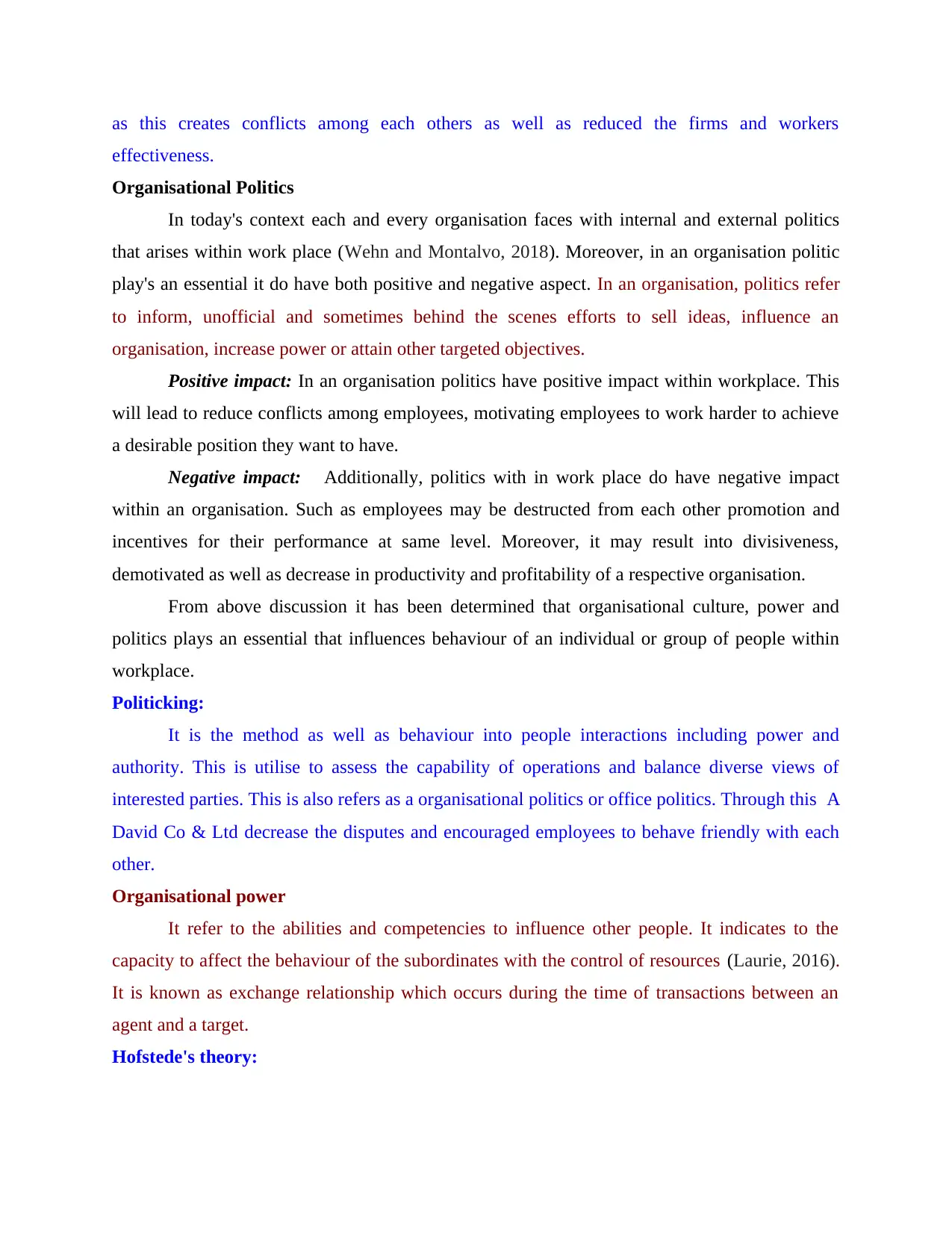
as this creates conflicts among each others as well as reduced the firms and workers
effectiveness.
Organisational Politics
In today's context each and every organisation faces with internal and external politics
that arises within work place (Wehn and Montalvo, 2018). Moreover, in an organisation politic
play's an essential it do have both positive and negative aspect. In an organisation, politics refer
to inform, unofficial and sometimes behind the scenes efforts to sell ideas, influence an
organisation, increase power or attain other targeted objectives.
Positive impact: In an organisation politics have positive impact within workplace. This
will lead to reduce conflicts among employees, motivating employees to work harder to achieve
a desirable position they want to have.
Negative impact: Additionally, politics with in work place do have negative impact
within an organisation. Such as employees may be destructed from each other promotion and
incentives for their performance at same level. Moreover, it may result into divisiveness,
demotivated as well as decrease in productivity and profitability of a respective organisation.
From above discussion it has been determined that organisational culture, power and
politics plays an essential that influences behaviour of an individual or group of people within
workplace.
Politicking:
It is the method as well as behaviour into people interactions including power and
authority. This is utilise to assess the capability of operations and balance diverse views of
interested parties. This is also refers as a organisational politics or office politics. Through this A
David Co & Ltd decrease the disputes and encouraged employees to behave friendly with each
other.
Organisational power
It refer to the abilities and competencies to influence other people. It indicates to the
capacity to affect the behaviour of the subordinates with the control of resources (Laurie, 2016).
It is known as exchange relationship which occurs during the time of transactions between an
agent and a target.
Hofstede's theory:
effectiveness.
Organisational Politics
In today's context each and every organisation faces with internal and external politics
that arises within work place (Wehn and Montalvo, 2018). Moreover, in an organisation politic
play's an essential it do have both positive and negative aspect. In an organisation, politics refer
to inform, unofficial and sometimes behind the scenes efforts to sell ideas, influence an
organisation, increase power or attain other targeted objectives.
Positive impact: In an organisation politics have positive impact within workplace. This
will lead to reduce conflicts among employees, motivating employees to work harder to achieve
a desirable position they want to have.
Negative impact: Additionally, politics with in work place do have negative impact
within an organisation. Such as employees may be destructed from each other promotion and
incentives for their performance at same level. Moreover, it may result into divisiveness,
demotivated as well as decrease in productivity and profitability of a respective organisation.
From above discussion it has been determined that organisational culture, power and
politics plays an essential that influences behaviour of an individual or group of people within
workplace.
Politicking:
It is the method as well as behaviour into people interactions including power and
authority. This is utilise to assess the capability of operations and balance diverse views of
interested parties. This is also refers as a organisational politics or office politics. Through this A
David Co & Ltd decrease the disputes and encouraged employees to behave friendly with each
other.
Organisational power
It refer to the abilities and competencies to influence other people. It indicates to the
capacity to affect the behaviour of the subordinates with the control of resources (Laurie, 2016).
It is known as exchange relationship which occurs during the time of transactions between an
agent and a target.
Hofstede's theory:
⊘ This is a preview!⊘
Do you want full access?
Subscribe today to unlock all pages.

Trusted by 1+ million students worldwide
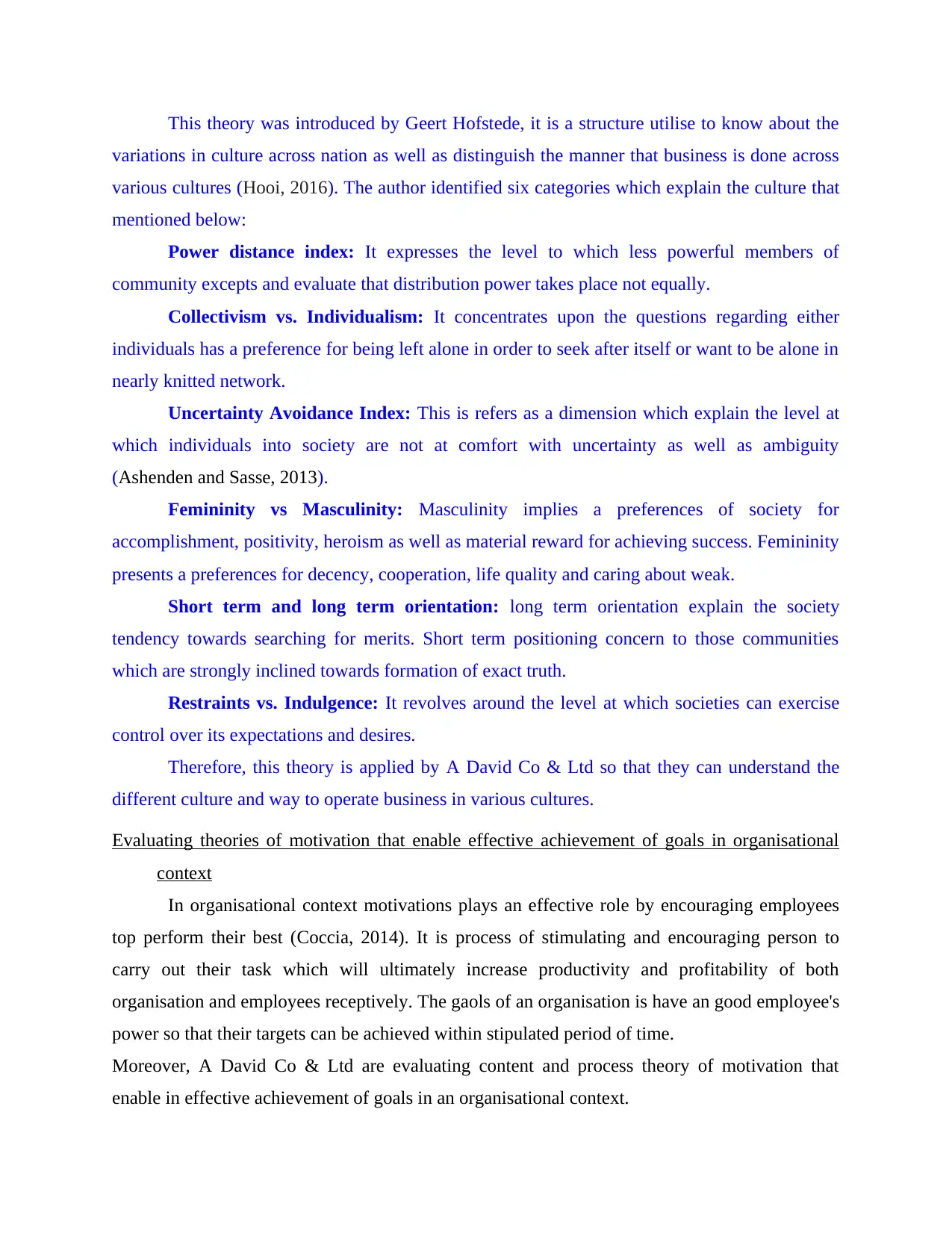
This theory was introduced by Geert Hofstede, it is a structure utilise to know about the
variations in culture across nation as well as distinguish the manner that business is done across
various cultures (Hooi, 2016). The author identified six categories which explain the culture that
mentioned below:
Power distance index: It expresses the level to which less powerful members of
community excepts and evaluate that distribution power takes place not equally.
Collectivism vs. Individualism: It concentrates upon the questions regarding either
individuals has a preference for being left alone in order to seek after itself or want to be alone in
nearly knitted network.
Uncertainty Avoidance Index: This is refers as a dimension which explain the level at
which individuals into society are not at comfort with uncertainty as well as ambiguity
(Ashenden and Sasse, 2013).
Femininity vs Masculinity: Masculinity implies a preferences of society for
accomplishment, positivity, heroism as well as material reward for achieving success. Femininity
presents a preferences for decency, cooperation, life quality and caring about weak.
Short term and long term orientation: long term orientation explain the society
tendency towards searching for merits. Short term positioning concern to those communities
which are strongly inclined towards formation of exact truth.
Restraints vs. Indulgence: It revolves around the level at which societies can exercise
control over its expectations and desires.
Therefore, this theory is applied by A David Co & Ltd so that they can understand the
different culture and way to operate business in various cultures.
Evaluating theories of motivation that enable effective achievement of goals in organisational
context
In organisational context motivations plays an effective role by encouraging employees
top perform their best (Coccia, 2014). It is process of stimulating and encouraging person to
carry out their task which will ultimately increase productivity and profitability of both
organisation and employees receptively. The gaols of an organisation is have an good employee's
power so that their targets can be achieved within stipulated period of time.
Moreover, A David Co & Ltd are evaluating content and process theory of motivation that
enable in effective achievement of goals in an organisational context.
variations in culture across nation as well as distinguish the manner that business is done across
various cultures (Hooi, 2016). The author identified six categories which explain the culture that
mentioned below:
Power distance index: It expresses the level to which less powerful members of
community excepts and evaluate that distribution power takes place not equally.
Collectivism vs. Individualism: It concentrates upon the questions regarding either
individuals has a preference for being left alone in order to seek after itself or want to be alone in
nearly knitted network.
Uncertainty Avoidance Index: This is refers as a dimension which explain the level at
which individuals into society are not at comfort with uncertainty as well as ambiguity
(Ashenden and Sasse, 2013).
Femininity vs Masculinity: Masculinity implies a preferences of society for
accomplishment, positivity, heroism as well as material reward for achieving success. Femininity
presents a preferences for decency, cooperation, life quality and caring about weak.
Short term and long term orientation: long term orientation explain the society
tendency towards searching for merits. Short term positioning concern to those communities
which are strongly inclined towards formation of exact truth.
Restraints vs. Indulgence: It revolves around the level at which societies can exercise
control over its expectations and desires.
Therefore, this theory is applied by A David Co & Ltd so that they can understand the
different culture and way to operate business in various cultures.
Evaluating theories of motivation that enable effective achievement of goals in organisational
context
In organisational context motivations plays an effective role by encouraging employees
top perform their best (Coccia, 2014). It is process of stimulating and encouraging person to
carry out their task which will ultimately increase productivity and profitability of both
organisation and employees receptively. The gaols of an organisation is have an good employee's
power so that their targets can be achieved within stipulated period of time.
Moreover, A David Co & Ltd are evaluating content and process theory of motivation that
enable in effective achievement of goals in an organisational context.
Paraphrase This Document
Need a fresh take? Get an instant paraphrase of this document with our AI Paraphraser
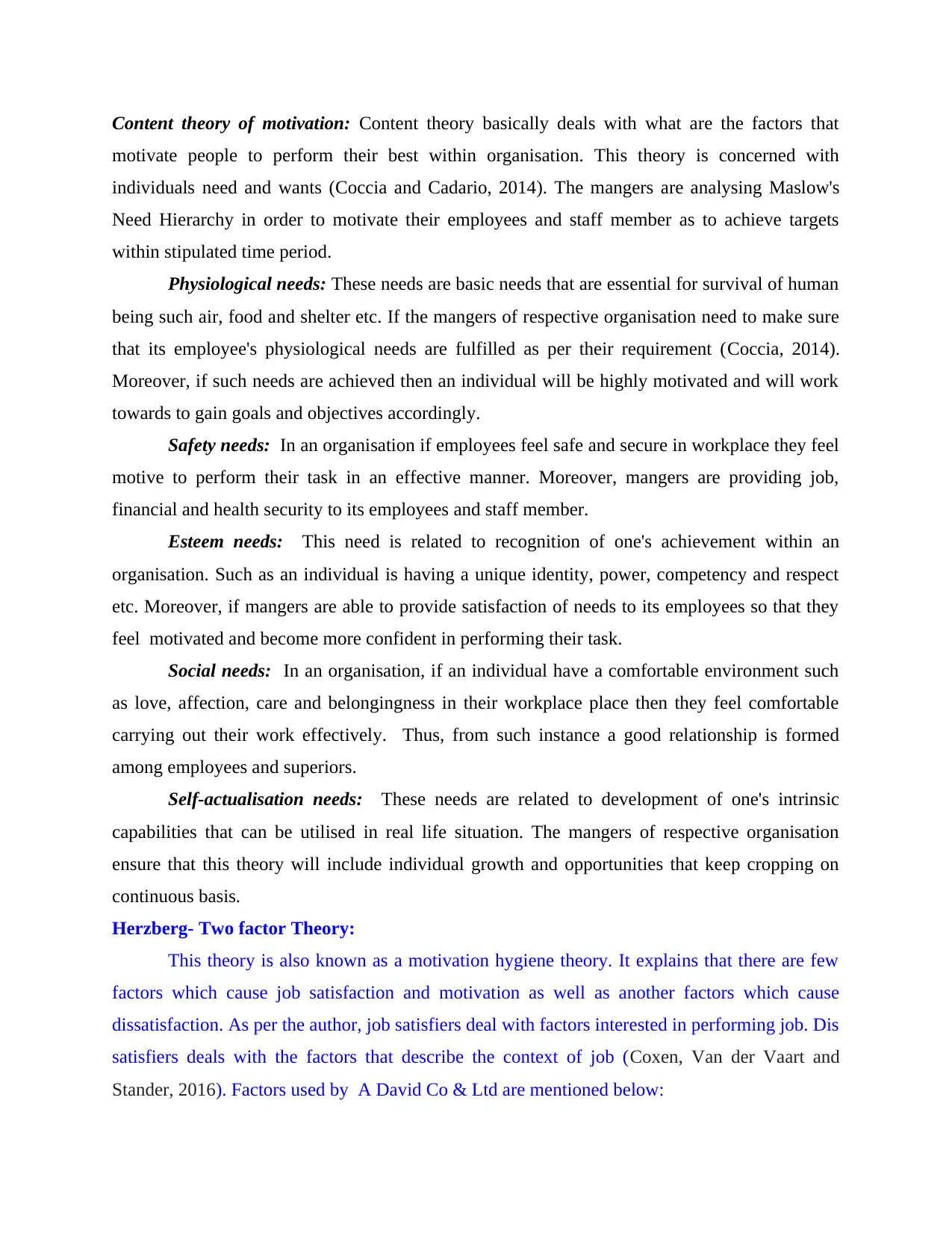
Content theory of motivation: Content theory basically deals with what are the factors that
motivate people to perform their best within organisation. This theory is concerned with
individuals need and wants (Coccia and Cadario, 2014). The mangers are analysing Maslow's
Need Hierarchy in order to motivate their employees and staff member as to achieve targets
within stipulated time period.
Physiological needs: These needs are basic needs that are essential for survival of human
being such air, food and shelter etc. If the mangers of respective organisation need to make sure
that its employee's physiological needs are fulfilled as per their requirement (Coccia, 2014).
Moreover, if such needs are achieved then an individual will be highly motivated and will work
towards to gain goals and objectives accordingly.
Safety needs: In an organisation if employees feel safe and secure in workplace they feel
motive to perform their task in an effective manner. Moreover, mangers are providing job,
financial and health security to its employees and staff member.
Esteem needs: This need is related to recognition of one's achievement within an
organisation. Such as an individual is having a unique identity, power, competency and respect
etc. Moreover, if mangers are able to provide satisfaction of needs to its employees so that they
feel motivated and become more confident in performing their task.
Social needs: In an organisation, if an individual have a comfortable environment such
as love, affection, care and belongingness in their workplace place then they feel comfortable
carrying out their work effectively. Thus, from such instance a good relationship is formed
among employees and superiors.
Self-actualisation needs: These needs are related to development of one's intrinsic
capabilities that can be utilised in real life situation. The mangers of respective organisation
ensure that this theory will include individual growth and opportunities that keep cropping on
continuous basis.
Herzberg- Two factor Theory:
This theory is also known as a motivation hygiene theory. It explains that there are few
factors which cause job satisfaction and motivation as well as another factors which cause
dissatisfaction. As per the author, job satisfiers deal with factors interested in performing job. Dis
satisfiers deals with the factors that describe the context of job (Coxen, Van der Vaart and
Stander, 2016). Factors used by A David Co & Ltd are mentioned below:
motivate people to perform their best within organisation. This theory is concerned with
individuals need and wants (Coccia and Cadario, 2014). The mangers are analysing Maslow's
Need Hierarchy in order to motivate their employees and staff member as to achieve targets
within stipulated time period.
Physiological needs: These needs are basic needs that are essential for survival of human
being such air, food and shelter etc. If the mangers of respective organisation need to make sure
that its employee's physiological needs are fulfilled as per their requirement (Coccia, 2014).
Moreover, if such needs are achieved then an individual will be highly motivated and will work
towards to gain goals and objectives accordingly.
Safety needs: In an organisation if employees feel safe and secure in workplace they feel
motive to perform their task in an effective manner. Moreover, mangers are providing job,
financial and health security to its employees and staff member.
Esteem needs: This need is related to recognition of one's achievement within an
organisation. Such as an individual is having a unique identity, power, competency and respect
etc. Moreover, if mangers are able to provide satisfaction of needs to its employees so that they
feel motivated and become more confident in performing their task.
Social needs: In an organisation, if an individual have a comfortable environment such
as love, affection, care and belongingness in their workplace place then they feel comfortable
carrying out their work effectively. Thus, from such instance a good relationship is formed
among employees and superiors.
Self-actualisation needs: These needs are related to development of one's intrinsic
capabilities that can be utilised in real life situation. The mangers of respective organisation
ensure that this theory will include individual growth and opportunities that keep cropping on
continuous basis.
Herzberg- Two factor Theory:
This theory is also known as a motivation hygiene theory. It explains that there are few
factors which cause job satisfaction and motivation as well as another factors which cause
dissatisfaction. As per the author, job satisfiers deal with factors interested in performing job. Dis
satisfiers deals with the factors that describe the context of job (Coxen, Van der Vaart and
Stander, 2016). Factors used by A David Co & Ltd are mentioned below:
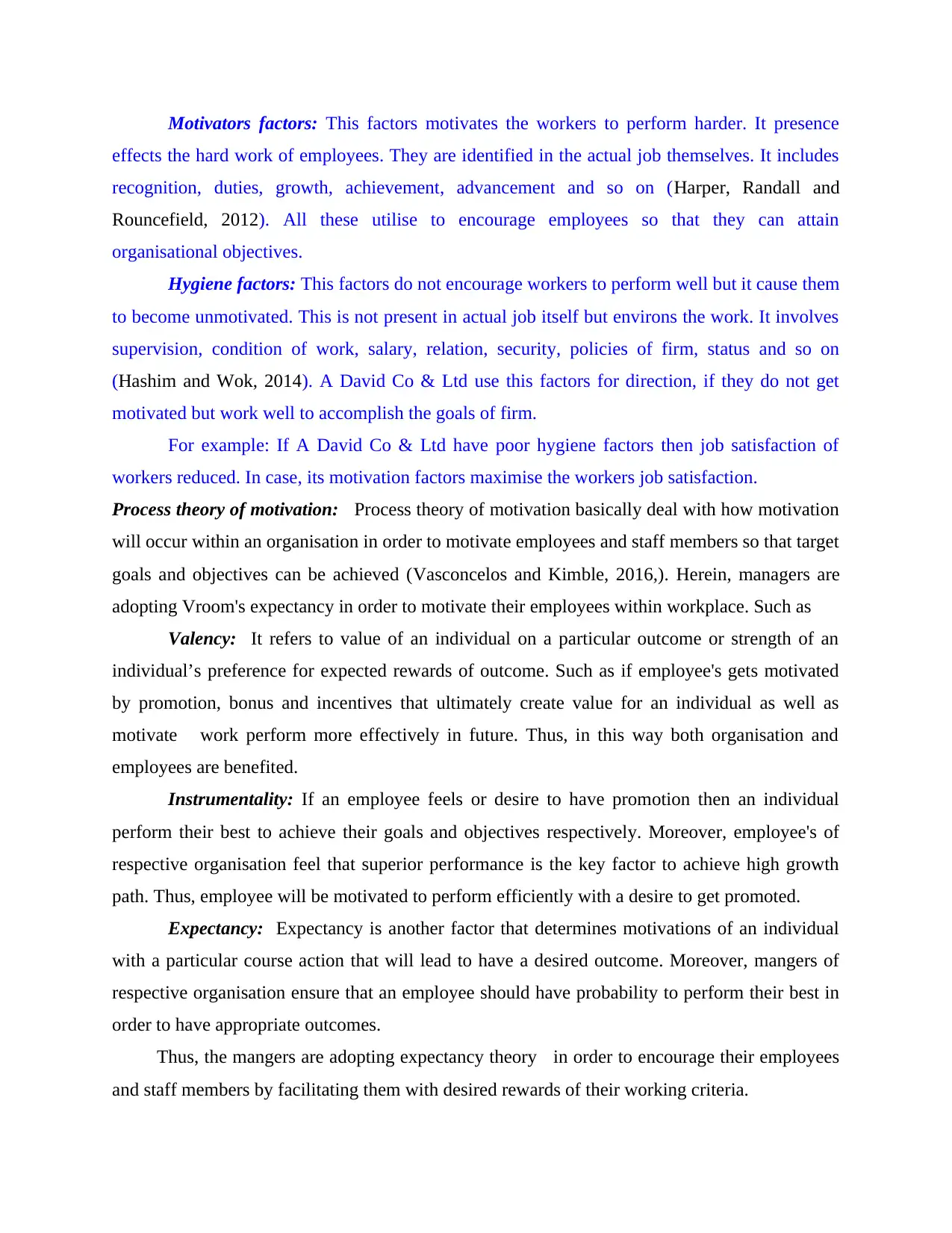
Motivators factors: This factors motivates the workers to perform harder. It presence
effects the hard work of employees. They are identified in the actual job themselves. It includes
recognition, duties, growth, achievement, advancement and so on (Harper, Randall and
Rouncefield, 2012). All these utilise to encourage employees so that they can attain
organisational objectives.
Hygiene factors: This factors do not encourage workers to perform well but it cause them
to become unmotivated. This is not present in actual job itself but environs the work. It involves
supervision, condition of work, salary, relation, security, policies of firm, status and so on
(Hashim and Wok, 2014). A David Co & Ltd use this factors for direction, if they do not get
motivated but work well to accomplish the goals of firm.
For example: If A David Co & Ltd have poor hygiene factors then job satisfaction of
workers reduced. In case, its motivation factors maximise the workers job satisfaction.
Process theory of motivation: Process theory of motivation basically deal with how motivation
will occur within an organisation in order to motivate employees and staff members so that target
goals and objectives can be achieved (Vasconcelos and Kimble, 2016,). Herein, managers are
adopting Vroom's expectancy in order to motivate their employees within workplace. Such as
Valency: It refers to value of an individual on a particular outcome or strength of an
individual’s preference for expected rewards of outcome. Such as if employee's gets motivated
by promotion, bonus and incentives that ultimately create value for an individual as well as
motivate work perform more effectively in future. Thus, in this way both organisation and
employees are benefited.
Instrumentality: If an employee feels or desire to have promotion then an individual
perform their best to achieve their goals and objectives respectively. Moreover, employee's of
respective organisation feel that superior performance is the key factor to achieve high growth
path. Thus, employee will be motivated to perform efficiently with a desire to get promoted.
Expectancy: Expectancy is another factor that determines motivations of an individual
with a particular course action that will lead to have a desired outcome. Moreover, mangers of
respective organisation ensure that an employee should have probability to perform their best in
order to have appropriate outcomes.
Thus, the mangers are adopting expectancy theory in order to encourage their employees
and staff members by facilitating them with desired rewards of their working criteria.
effects the hard work of employees. They are identified in the actual job themselves. It includes
recognition, duties, growth, achievement, advancement and so on (Harper, Randall and
Rouncefield, 2012). All these utilise to encourage employees so that they can attain
organisational objectives.
Hygiene factors: This factors do not encourage workers to perform well but it cause them
to become unmotivated. This is not present in actual job itself but environs the work. It involves
supervision, condition of work, salary, relation, security, policies of firm, status and so on
(Hashim and Wok, 2014). A David Co & Ltd use this factors for direction, if they do not get
motivated but work well to accomplish the goals of firm.
For example: If A David Co & Ltd have poor hygiene factors then job satisfaction of
workers reduced. In case, its motivation factors maximise the workers job satisfaction.
Process theory of motivation: Process theory of motivation basically deal with how motivation
will occur within an organisation in order to motivate employees and staff members so that target
goals and objectives can be achieved (Vasconcelos and Kimble, 2016,). Herein, managers are
adopting Vroom's expectancy in order to motivate their employees within workplace. Such as
Valency: It refers to value of an individual on a particular outcome or strength of an
individual’s preference for expected rewards of outcome. Such as if employee's gets motivated
by promotion, bonus and incentives that ultimately create value for an individual as well as
motivate work perform more effectively in future. Thus, in this way both organisation and
employees are benefited.
Instrumentality: If an employee feels or desire to have promotion then an individual
perform their best to achieve their goals and objectives respectively. Moreover, employee's of
respective organisation feel that superior performance is the key factor to achieve high growth
path. Thus, employee will be motivated to perform efficiently with a desire to get promoted.
Expectancy: Expectancy is another factor that determines motivations of an individual
with a particular course action that will lead to have a desired outcome. Moreover, mangers of
respective organisation ensure that an employee should have probability to perform their best in
order to have appropriate outcomes.
Thus, the mangers are adopting expectancy theory in order to encourage their employees
and staff members by facilitating them with desired rewards of their working criteria.
⊘ This is a preview!⊘
Do you want full access?
Subscribe today to unlock all pages.

Trusted by 1+ million students worldwide
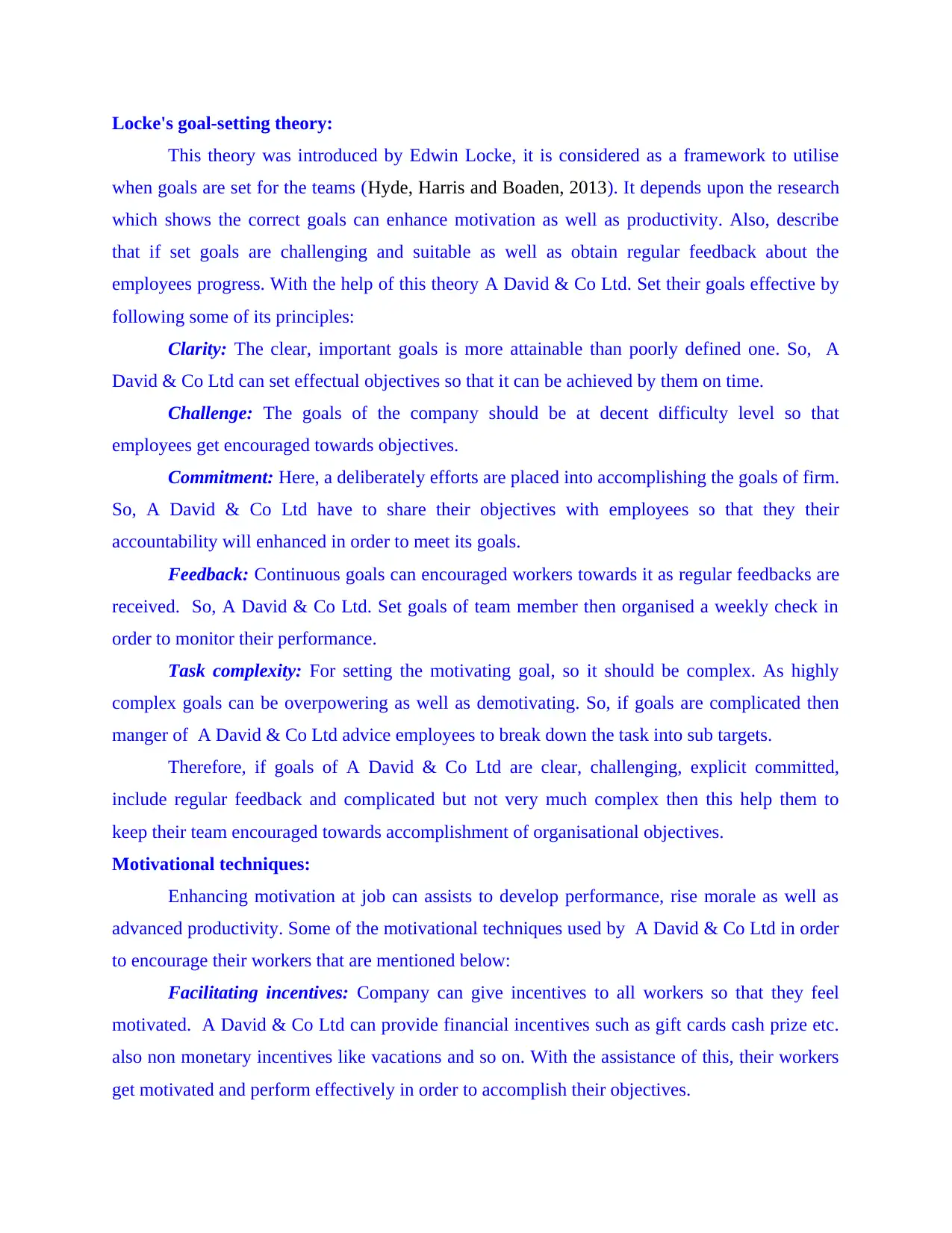
Locke's goal-setting theory:
This theory was introduced by Edwin Locke, it is considered as a framework to utilise
when goals are set for the teams (Hyde, Harris and Boaden, 2013). It depends upon the research
which shows the correct goals can enhance motivation as well as productivity. Also, describe
that if set goals are challenging and suitable as well as obtain regular feedback about the
employees progress. With the help of this theory A David & Co Ltd. Set their goals effective by
following some of its principles:
Clarity: The clear, important goals is more attainable than poorly defined one. So, A
David & Co Ltd can set effectual objectives so that it can be achieved by them on time.
Challenge: The goals of the company should be at decent difficulty level so that
employees get encouraged towards objectives.
Commitment: Here, a deliberately efforts are placed into accomplishing the goals of firm.
So, A David & Co Ltd have to share their objectives with employees so that they their
accountability will enhanced in order to meet its goals.
Feedback: Continuous goals can encouraged workers towards it as regular feedbacks are
received. So, A David & Co Ltd. Set goals of team member then organised a weekly check in
order to monitor their performance.
Task complexity: For setting the motivating goal, so it should be complex. As highly
complex goals can be overpowering as well as demotivating. So, if goals are complicated then
manger of A David & Co Ltd advice employees to break down the task into sub targets.
Therefore, if goals of A David & Co Ltd are clear, challenging, explicit committed,
include regular feedback and complicated but not very much complex then this help them to
keep their team encouraged towards accomplishment of organisational objectives.
Motivational techniques:
Enhancing motivation at job can assists to develop performance, rise morale as well as
advanced productivity. Some of the motivational techniques used by A David & Co Ltd in order
to encourage their workers that are mentioned below:
Facilitating incentives: Company can give incentives to all workers so that they feel
motivated. A David & Co Ltd can provide financial incentives such as gift cards cash prize etc.
also non monetary incentives like vacations and so on. With the assistance of this, their workers
get motivated and perform effectively in order to accomplish their objectives.
This theory was introduced by Edwin Locke, it is considered as a framework to utilise
when goals are set for the teams (Hyde, Harris and Boaden, 2013). It depends upon the research
which shows the correct goals can enhance motivation as well as productivity. Also, describe
that if set goals are challenging and suitable as well as obtain regular feedback about the
employees progress. With the help of this theory A David & Co Ltd. Set their goals effective by
following some of its principles:
Clarity: The clear, important goals is more attainable than poorly defined one. So, A
David & Co Ltd can set effectual objectives so that it can be achieved by them on time.
Challenge: The goals of the company should be at decent difficulty level so that
employees get encouraged towards objectives.
Commitment: Here, a deliberately efforts are placed into accomplishing the goals of firm.
So, A David & Co Ltd have to share their objectives with employees so that they their
accountability will enhanced in order to meet its goals.
Feedback: Continuous goals can encouraged workers towards it as regular feedbacks are
received. So, A David & Co Ltd. Set goals of team member then organised a weekly check in
order to monitor their performance.
Task complexity: For setting the motivating goal, so it should be complex. As highly
complex goals can be overpowering as well as demotivating. So, if goals are complicated then
manger of A David & Co Ltd advice employees to break down the task into sub targets.
Therefore, if goals of A David & Co Ltd are clear, challenging, explicit committed,
include regular feedback and complicated but not very much complex then this help them to
keep their team encouraged towards accomplishment of organisational objectives.
Motivational techniques:
Enhancing motivation at job can assists to develop performance, rise morale as well as
advanced productivity. Some of the motivational techniques used by A David & Co Ltd in order
to encourage their workers that are mentioned below:
Facilitating incentives: Company can give incentives to all workers so that they feel
motivated. A David & Co Ltd can provide financial incentives such as gift cards cash prize etc.
also non monetary incentives like vacations and so on. With the assistance of this, their workers
get motivated and perform effectively in order to accomplish their objectives.
Paraphrase This Document
Need a fresh take? Get an instant paraphrase of this document with our AI Paraphraser
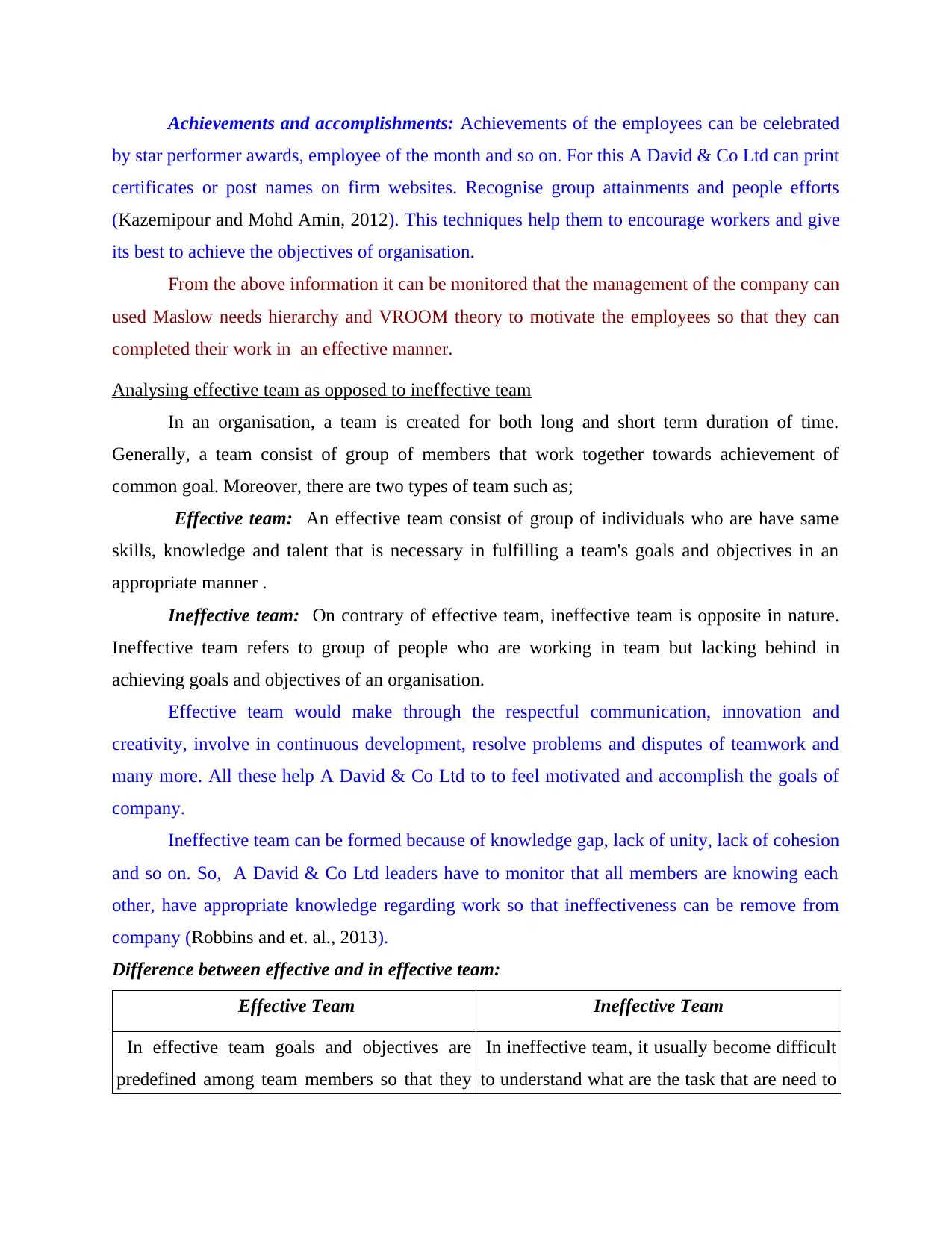
Achievements and accomplishments: Achievements of the employees can be celebrated
by star performer awards, employee of the month and so on. For this A David & Co Ltd can print
certificates or post names on firm websites. Recognise group attainments and people efforts
(Kazemipour and Mohd Amin, 2012). This techniques help them to encourage workers and give
its best to achieve the objectives of organisation.
From the above information it can be monitored that the management of the company can
used Maslow needs hierarchy and VROOM theory to motivate the employees so that they can
completed their work in an effective manner.
Analysing effective team as opposed to ineffective team
In an organisation, a team is created for both long and short term duration of time.
Generally, a team consist of group of members that work together towards achievement of
common goal. Moreover, there are two types of team such as;
Effective team: An effective team consist of group of individuals who are have same
skills, knowledge and talent that is necessary in fulfilling a team's goals and objectives in an
appropriate manner .
Ineffective team: On contrary of effective team, ineffective team is opposite in nature.
Ineffective team refers to group of people who are working in team but lacking behind in
achieving goals and objectives of an organisation.
Effective team would make through the respectful communication, innovation and
creativity, involve in continuous development, resolve problems and disputes of teamwork and
many more. All these help A David & Co Ltd to to feel motivated and accomplish the goals of
company.
Ineffective team can be formed because of knowledge gap, lack of unity, lack of cohesion
and so on. So, A David & Co Ltd leaders have to monitor that all members are knowing each
other, have appropriate knowledge regarding work so that ineffectiveness can be remove from
company (Robbins and et. al., 2013).
Difference between effective and in effective team:
Effective Team Ineffective Team
In effective team goals and objectives are
predefined among team members so that they
In ineffective team, it usually become difficult
to understand what are the task that are need to
by star performer awards, employee of the month and so on. For this A David & Co Ltd can print
certificates or post names on firm websites. Recognise group attainments and people efforts
(Kazemipour and Mohd Amin, 2012). This techniques help them to encourage workers and give
its best to achieve the objectives of organisation.
From the above information it can be monitored that the management of the company can
used Maslow needs hierarchy and VROOM theory to motivate the employees so that they can
completed their work in an effective manner.
Analysing effective team as opposed to ineffective team
In an organisation, a team is created for both long and short term duration of time.
Generally, a team consist of group of members that work together towards achievement of
common goal. Moreover, there are two types of team such as;
Effective team: An effective team consist of group of individuals who are have same
skills, knowledge and talent that is necessary in fulfilling a team's goals and objectives in an
appropriate manner .
Ineffective team: On contrary of effective team, ineffective team is opposite in nature.
Ineffective team refers to group of people who are working in team but lacking behind in
achieving goals and objectives of an organisation.
Effective team would make through the respectful communication, innovation and
creativity, involve in continuous development, resolve problems and disputes of teamwork and
many more. All these help A David & Co Ltd to to feel motivated and accomplish the goals of
company.
Ineffective team can be formed because of knowledge gap, lack of unity, lack of cohesion
and so on. So, A David & Co Ltd leaders have to monitor that all members are knowing each
other, have appropriate knowledge regarding work so that ineffectiveness can be remove from
company (Robbins and et. al., 2013).
Difference between effective and in effective team:
Effective Team Ineffective Team
In effective team goals and objectives are
predefined among team members so that they
In ineffective team, it usually become difficult
to understand what are the task that are need to
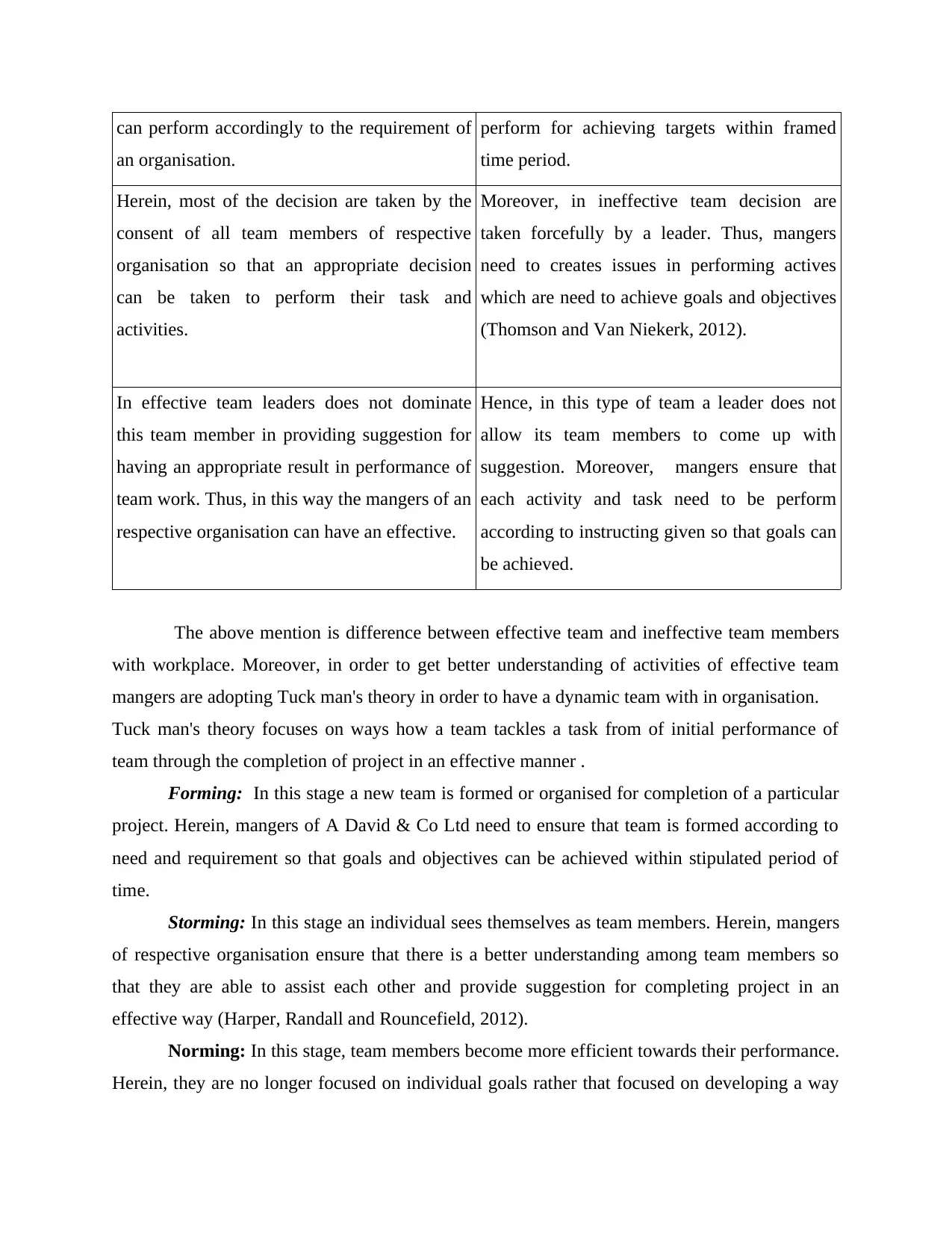
can perform accordingly to the requirement of
an organisation.
perform for achieving targets within framed
time period.
Herein, most of the decision are taken by the
consent of all team members of respective
organisation so that an appropriate decision
can be taken to perform their task and
activities.
Moreover, in ineffective team decision are
taken forcefully by a leader. Thus, mangers
need to creates issues in performing actives
which are need to achieve goals and objectives
(Thomson and Van Niekerk, 2012).
In effective team leaders does not dominate
this team member in providing suggestion for
having an appropriate result in performance of
team work. Thus, in this way the mangers of an
respective organisation can have an effective.
Hence, in this type of team a leader does not
allow its team members to come up with
suggestion. Moreover, mangers ensure that
each activity and task need to be perform
according to instructing given so that goals can
be achieved.
The above mention is difference between effective team and ineffective team members
with workplace. Moreover, in order to get better understanding of activities of effective team
mangers are adopting Tuck man's theory in order to have a dynamic team with in organisation.
Tuck man's theory focuses on ways how a team tackles a task from of initial performance of
team through the completion of project in an effective manner .
Forming: In this stage a new team is formed or organised for completion of a particular
project. Herein, mangers of A David & Co Ltd need to ensure that team is formed according to
need and requirement so that goals and objectives can be achieved within stipulated period of
time.
Storming: In this stage an individual sees themselves as team members. Herein, mangers
of respective organisation ensure that there is a better understanding among team members so
that they are able to assist each other and provide suggestion for completing project in an
effective way (Harper, Randall and Rouncefield, 2012).
Norming: In this stage, team members become more efficient towards their performance.
Herein, they are no longer focused on individual goals rather that focused on developing a way
an organisation.
perform for achieving targets within framed
time period.
Herein, most of the decision are taken by the
consent of all team members of respective
organisation so that an appropriate decision
can be taken to perform their task and
activities.
Moreover, in ineffective team decision are
taken forcefully by a leader. Thus, mangers
need to creates issues in performing actives
which are need to achieve goals and objectives
(Thomson and Van Niekerk, 2012).
In effective team leaders does not dominate
this team member in providing suggestion for
having an appropriate result in performance of
team work. Thus, in this way the mangers of an
respective organisation can have an effective.
Hence, in this type of team a leader does not
allow its team members to come up with
suggestion. Moreover, mangers ensure that
each activity and task need to be perform
according to instructing given so that goals can
be achieved.
The above mention is difference between effective team and ineffective team members
with workplace. Moreover, in order to get better understanding of activities of effective team
mangers are adopting Tuck man's theory in order to have a dynamic team with in organisation.
Tuck man's theory focuses on ways how a team tackles a task from of initial performance of
team through the completion of project in an effective manner .
Forming: In this stage a new team is formed or organised for completion of a particular
project. Herein, mangers of A David & Co Ltd need to ensure that team is formed according to
need and requirement so that goals and objectives can be achieved within stipulated period of
time.
Storming: In this stage an individual sees themselves as team members. Herein, mangers
of respective organisation ensure that there is a better understanding among team members so
that they are able to assist each other and provide suggestion for completing project in an
effective way (Harper, Randall and Rouncefield, 2012).
Norming: In this stage, team members become more efficient towards their performance.
Herein, they are no longer focused on individual goals rather that focused on developing a way
⊘ This is a preview!⊘
Do you want full access?
Subscribe today to unlock all pages.

Trusted by 1+ million students worldwide
1 out of 21
Related Documents
Your All-in-One AI-Powered Toolkit for Academic Success.
+13062052269
info@desklib.com
Available 24*7 on WhatsApp / Email
![[object Object]](/_next/static/media/star-bottom.7253800d.svg)
Unlock your academic potential
Copyright © 2020–2026 A2Z Services. All Rights Reserved. Developed and managed by ZUCOL.





